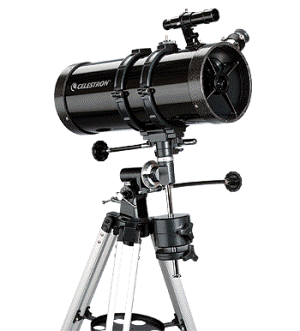
Are you into astronomy? Does viewing the heavenly bodies above us excite you? If you answered 'yes' to both these questions, you need to get yourself a telescope. Determining the best telescope for viewing planets and stars can be a daunting feat. Fret not, as this list will guide you in deciding which telescope works best for you and your needs.
Celestron - PowerSeeker 127EQ Telescope

Beginners will enjoy the user-friendly features of the Celestron's PowerSeeker 127EQ. This telescope has been designed with a blend of value, quality, power, and user-friendly features to enhance the experience for first-time telescope users. High-quality and affordable are two features that don't usually go together. Luckily, the Celestron - PowerSeeker 127EQ provides both! The 3x Barlow lens helps in tripling the magnification power of the included 20mm and 4mm eyepieces. It's the best way for kids to learn about the night sky and the best accessory to use in your next observing session.
Gskyer AZ70400

It can be frustrating for newbies without any prior knowledge to use telescopes. User-friendly telescopes such as Gskyer AZ70400 gives newbies a chance to enjoy everything the night sky has to offer without breaking a sweat. This telescope is simple and convenient to use. The body, accessories, and tripod are lightweight and easily fit in the provided travel bag for easy portability.
Also Read : NASA to Perform Checkpoint Rehearsal as OSIRIS-Rex Spacecraft will Touch Base at Bennu for Asteroid Sampling
Celestron - 114LCM Computerized Newtonian Telescope

Are you looking for the freshest and best telescope for viewing planets? This computerized automatic telescope could be your best bet. It uses all-glass optics that can automatically locate 4,000 celestial objects with its GoTo mount and hand control. It also uses a star tracing technology, which can also be found on other advanced telescopes. If you're not sure of what to look at, its Sky Tour button will do the work for you. The Celestron LCM telescope comes with everything you need for stargazing. It includes two high-quality eyepieces, an adjustable aluminum tripod, and a StarPointer red dot finderscope.
Celestron - AstroMaster 90AZ Refractor Telescope

The Celestron AstroMaster 90AZ is a dynamic and user-friendly refractor telescope. It features high quality fully-coated 90MM glass optics, a durable and lightweight frame, two eyepieces, a StarPointer red dot finderscope, and an adjustable tripod. It boasts its Newtonian reflector optical design, which uses a primary mirror with enough light-gathering ability to see fine detail in celestial objects like the Moon's craters and Saturn's rings. Setup for this telescope is quick and easy, with no tools required. Kids and adults alike will enjoy exploring the wild blue yonder with this cool telescope.
Orion Observer 80ST 80mm Equatorial Refractor Telescope

Delve into the planets and scour the heavens for bright, deep stars with the compact and low-cost Orion ShortTube 80mm refractor telescope. This telescope is perfect for those who are always on the go. The small Observer 80ST packs a lot of performance into a dainty telescope design. Its lens delivers sharp and bright wide-field views of the cosmos, which is excellent for exploring the Moon, extensive views of bright planets and their closeby moons, star arrays, bright nebulas, and galaxies. The included EQ-1B equatorial mount and adjustable-height tripod allow smooth slow-motion movement to trail objects in the sky easily.
Now that you know the best telescopes for viewing planets and stars go ahead and pick the one you like the most. None of these will disappoint you as even beginners will find them pretty easy to use. What are you waiting for? Place your order now and enjoy exploring the sky soon.












